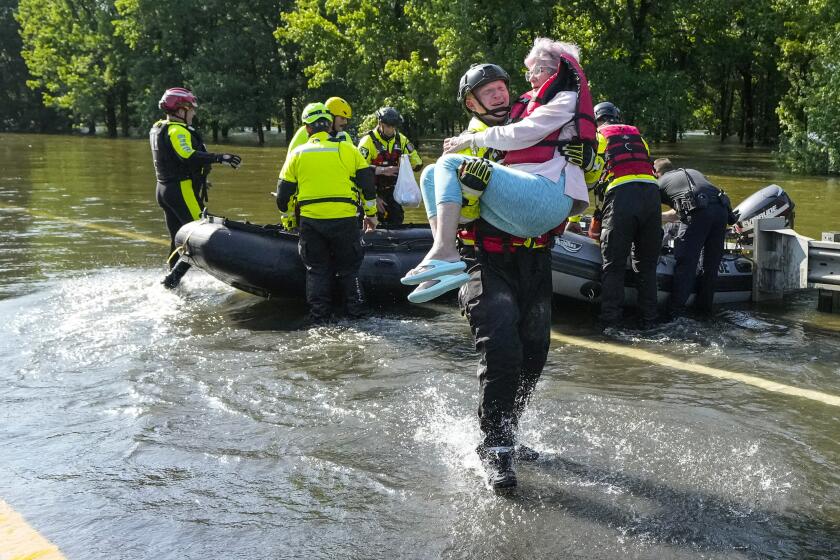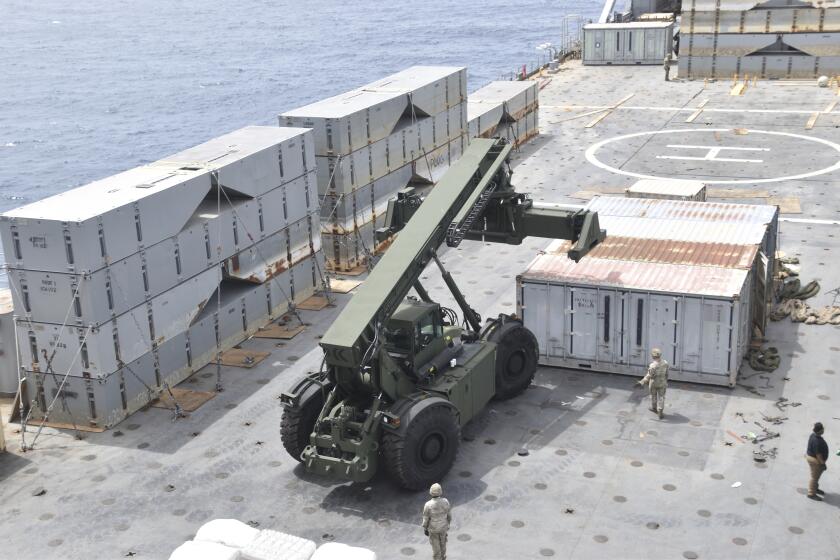Serbian Gunmen Hold 7,000 Captive in Bosnia : Yugoslavia: Captors demand safe passage for Serbian forces out of the war-racked region. Terrorism is becoming the negotiating tool in the conflict.
Serbian gunmen held more than 7,000 Muslim women and children captive near Sarajevo on Wednesday, saying they will release the civilians only if Serbian forces that have attacked Bosnia-Herzegovina are allowed unhindered retreat.
As the 11-month-old Yugoslav conflict degenerates into lawlessness, hostage-taking and other acts of terrorism have increasingly become the negotiating tool employed by nationalist fanatics fighting for territory and power.
“We are giving you 24 hours for a peaceful solution” to be worked out, warned SRNA, a new Serbian news agency in occupied Bosnia.
The agency had earlier stated that the gunmen’s conditions for release of the convoy of Muslim refugees included safe passage for Serbian military cadets, evacuation of federal army officers and their weapons and food relief for those Serbian fighters remaining in Sarajevo.
The ultimatum, attributed to unnamed Serbian guerrillas, made no mention of what would happen to the hostages if the forces loyal to the Bosnian government failed to meet the Serbian minorities’ demands.
The Bosnian leadership under Muslim Alija Izetbegovic had imposed a Tuesday deadline for withdrawal of federal forces from the republic.
Bosnia won U.S. and European recognition of its sovereignty more than a month ago, but for the past 10 weeks it has been under siege by Serbs opposed to separation from Serbia.
Western nations have accused Serbian President Slobodan Milosevic of instigating the uprising and have threatened to isolate and punish his staunchly nationalist regime.
In Washington, the U.S. State Department on Wednesday stepped up pressure on Serbia by suspending the landing rights of the Serb-run Yugoslav airline JAT.
At least 2,000 people--mostly Muslims--have been killed in Bosnia since Serbian guerrillas rose up in arms against a Feb. 29 referendum endorsing independence for the republic of 4.4 million.
Serbian fighters from within the republic and from Belgrade-based militias have swept through ethnically mixed Bosnia in a bloody campaign to “purify” the territory by driving out non-Serbs.
International denunciation of Serbia has mounted along with the casualties and the refugees, whose total grows by 20,000 each day. The 12-nation European Community, the United States and several Muslim countries have recalled their ambassadors from Belgrade to protest the violence and the largest civilian displacement since World War II.
But the moves to isolate Serbia have only intensified anti-Western and anti-Muslim paranoia in what remains of the Yugoslav state, a desperate and impoverished alliance of Serbia and Montenegro.
The Belgrade-based Tanjug news agency denounced recent appeals by Western commentators for military intervention to halt the bloodshed in Bosnia and prevent it from spreading to other regions. Serbia’s predominantly Albanian province of Kosovo has been poised for rebellion for more than a year, and the unrecognized state of Macedonia is also seen as vulnerable to nationalist adventurism.
Tanjug contended that foreign governments have ganged up on Serbia with a “ferocity that can be compared only with the campaign against Iraq” and said that Western journalists and opinion-makers aim to see Serbia “humiliated and destroyed.”
Serbia has been accused of instigating the violence in Bosnia to grab territory needed for a corridor between the rump Yugoslav federation and Serb-occupied areas of Croatia.
Belgrade has particularly been targeted for criticism in recent weeks for supporting guerrilla factions that have terrorized Bosnian civilians, driving at least 700,000 from their homes.
Conditions for relief workers have become so difficult that the office of Sadako Ogata, the U.N. commissioner for refugees, has temporarily withdrawn aid units from Sarajevo.
“We are ready to move heaven and earth to bring food and medicine to these innocent people,” U.N. refugee official Jose Maria Mendiluce told reporters at the aid agency’s Geneva headquarters, referring to Bosnia’s masses of displaced civilians. “But we cannot operate under fire.”
In Washington, Ogata herself told reporters that most of the refugees in the splintered Yugoslavia are victims of “a very serious persecution based on ethnic origin.” The refugee commissioner added that Muslims are having the worst problems.
Her agency has 30 officials in the Yugoslav area. U.N. sources said they are appealing to government authorities to prevent the evictions of Muslims and Croats from Serb-held areas. But the evictions are continuing, and the United Nations is building a camp in Croatia for refugees.
In revoking the landing rights of JAT, the Bush Administration effectively severed direct air links between the United States and the disintegrating Yugoslav federation. State Department spokeswoman Margaret Tutwiler said the three-times-a-week Belgrade-New York-Chicago service produced an estimated 80% of JAT’s worldwide revenue.
Times staff writers Norman Kempster and Stanley Meisler in Washington contributed to this article.
More to Read
Start your day right
Sign up for Essential California for news, features and recommendations from the L.A. Times and beyond in your inbox six days a week.
You may occasionally receive promotional content from the Los Angeles Times.







